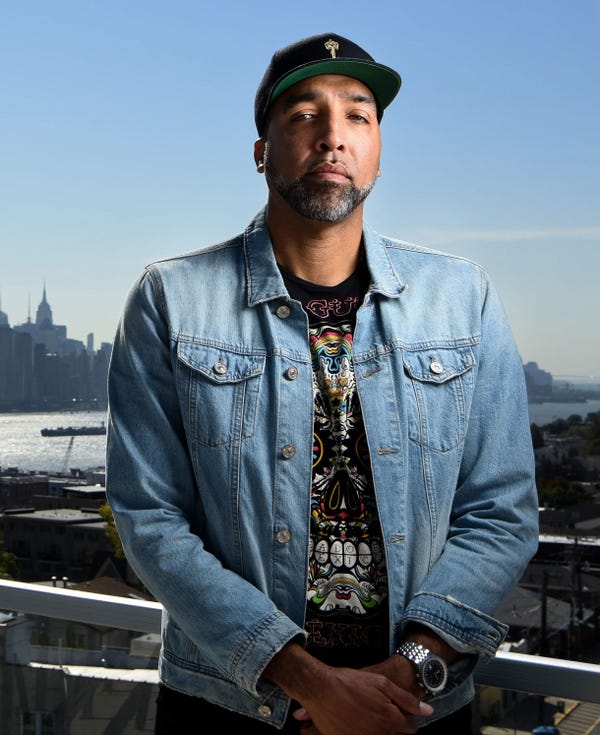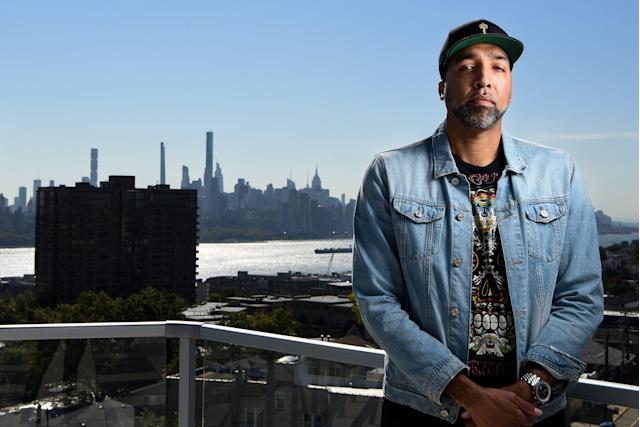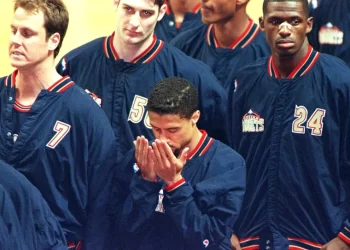By: Zachary Draves
Danny Reyes was born to play basketball.
Since he came into the world in Caguas, Puerto Rico, and came of age in Staten Island and Spanish Harlem, he was always seen with a basketball in his hands and honed his skills at every turn with dreams of becoming an NBA superstar.
He was so good in high school that college recruiters from Hartford, Marist, Hofstra, South Carolina State, and Maryland-Baltimore County were interested in him joining their teams.

(Courtesy: Youtube)
Everything seemed to be lining up for Danny until the night of April 23, 1998, on the New Jersey Turnpike.
He along with other New York basketball standouts Rayshawn Brown, Keshon Moore, and Jarmaine Grant were on their way to a talent showcase at North Carolina Central when they were pulled over by two state troopers and shot thirteen times in what was a clear case of racial profiling and police brutality.

(Courtesy: Youtube)
Three of the men were wounded and Danny was shot six times and was in critical condition and had to be airlifted to the hospital only to be arrested in the process.
For Danny, whose mother was a police officer, this was a tremendously conflicting moment because at a young age he was told to count on the police whenever there was any trouble but at the same time to be suspicious of certain officers when they engage in certain behaviors.
Afterward, Danny, Rayshawn, Keshon, and Jarmaine’s lives changed forever and their basketball dreams were shattered as they tried to recover physically and emotionally.

(Courtesy: The New York Times)
Danny had to spend a week in the ICU and had to forgo those opportunities to play college ball.
He had two bullets destroy the bones in his right arm and had two lodged in his hip with another entering and exiting his body and one more that still remains in his stomach.
The four men along with civil rights activist Rev. Al Sharpton and famed attorney Johnnie Cochran sued the state of New Jersey and received a $12.9 million settlement in February 2001 in what was the largest settlement for a racial profiling case in American history.

(Courtesy: New York Daily News)
The two officers involved were charged with attempted murder and aggravated assault but those charges were dropped.
They were forced to resign after they plead guilty to falsifying documents and lying to investigators to hide and conceal the fact that they shot these men because they were black.
What is remarkable about the Jersey 4 as they have been labeled is that unlike other cases of black men who have had physical intersections with the police, is that they have lived to tell the story and give personal testimony to the reality of what it means to be black in America.
In the years that followed, Danny, Rayshawn, Keshon, and Jarmaine did all they could to pick up the pieces of their lives and while it has been hard, to say the least, each found a pathway to some semblance of normalcy.
(Courtesy: USA Today)
I had the honor to communicate with Danny to get an understanding of how this incident impacted him then and now, a glimpse into what he is doing today, and his thoughts about a USA Today series that tells the story of him and his brothers https://www.usatoday.com/in-depth/news/nation/2021/10/16/jersey-four-new-jersey-turnpike-shooting-1998/8450435002/.

(Courtesy: USA Today)
Describe how the experience of what happened to you and your friends changed your life?
My experience of getting shot by the police 6 times and surviving forever change my life in many ways but the biggest change to the trajectory of my life was that I no longer was going to be a full-time basketball player. To that point I was always playing basketball from CYO, AAU, and High School basketball, and after I Graduated I began playing semi-pro basketball in the league in Puerto Rico right after Graduating for the next few summer months and Junior college basketball right till the shooting. Physical Therapy became a big part of my time during the first few years so I continue to improve physically as time went on. My dreams shattered so I needed to set new goals and new dreams for myself professionally and I continued to give my time to activism to fight Justice, equality, racial profiling, and police brutality. I am forever reminded because I do have permanent nerve damage in my arm so certain days the pain comes back a little stronger and I get that reminder.
How has your life been since 1998?
It was challenging at the beginning because physically I went through so much and had to deal
with the case and taking care of my family all while keeping a level head and working hard in Therapy to build my body to do all normal functions. Overall I have been blessed to still be living and taking care of my mother and family. I have been an entrepreneur for the past 20 years running my own companies all while doing charity work giving back to different communities. I have a beautiful thirteen-year-old daughter so I enjoy being a Dad.
What do you make of athletes using their platform and resources in pursuit of social justice?
I think it is good and necessary to have high-profile athletes use their platforms to shine a light and bring awareness to help the social justice movement. With social media in play, they can get the message out directly to the people and draw in media to cover it as well. I think it is a new day and today’s athletes have even a bigger voice than in the past so hopefully, it makes a difference.
What are some of the things you got going for you in the present day?
I am part owner of YaVe Tequila so continue to help build the brand working in sales, marketing, and distribution opportunities. Red Eye Films & Entertainment I have been running for the past 20 years so I continue to be involved in different aspects of Entertainment and currently I am producing Jersey 4 Documentary on our Jersey 4 story and also developing a scripted part of the story as well. Also in production of Warriors Documentary based on Gun Violence based on a true story. I am also the President of J4 Pass 2 Assist Foundation an official Non-profit organization Empowering Youth thru Mentoring, Training & Education. Neighborhood Outreach & Goodwill Ambassadors for Social Justice & Equality
Are you still close with Jermaine, Keshon, and Rayshawn?
We are still friends and in contact, we have been active the past several years shooting our Jersey 4 Documentary and still get together in the summer to conduct Pass 2 Assist youth Basketball clinics and functions. Jermaine I see more often because he is not only a friend but a business partner and this summer Ray Brown was my workout trainer so I am in much better shape.
What would you like your guys’ legacy to be?
That our story was a classic case of Racial Profiling and we were Blessed to have survived to tell our story. Profiling and being biased should never be tolerated and we must keep pushing for justice and equality for everyone. If we can all be from different neighborhoods and be
student-athletes stay out of trouble not be arrested or anything and on our way to a place of higher learning be targeted the way we were and gunned down because of the color of our skin all minorities have to say to themselves we can not win because even when we do the right thing we are still targets and that can’t ever be tolerated.
What do you hope people will take away from the new USA Today series?
I hope the people will get familiar with the story. different people can get different benefits from our story I believe. I hope it can change the mindset of any racist, bias prejudice people that may have read the story even If is just showing that we were and still are good people that unfortunately became the victims of racial profiling and police brutality and lost our basketball career. I also hope it can inspire many more.


 NFL
NFL





